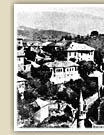
No permanent status has been determined by treaty. At the same time,
Greek guerilla bands were active in northern Epirus. The resolution of the issue depended on whether and along
which borders an Albanian state would be established. The Great Powers determined their
stance on the basis of their vested interests in the area. Thus, Italy and Austria-Hungary pursued the
establishment of the largest possible Albanian state, with lands especially to the south. They
were trying, that is, to incorporate the area of northern Epirus (Korytsa, Delvino, Argyrokastro,
Cheimara, Ayioi Saranta) into the territory of the new state.
Facing this prospect, Greek diplomacy tried to ensure the best results possible.
They knew that they had few chances of success and for this reason the northern Epirus
issue was used as a means of exerting pressure to secure the islands of the Aegean. On
4/17 December 1913 the Florence protocol was signed, which awarded the whole of northern
Epirus to Albania, while Greece proposed the issue of securing individual,
educational and religious rights for the Greek population there.
Northern Epirus, whose population consisted, according to official Greek estimations,
mostly of Greek-speaking or Albanian- and Vlach-speaking populations
of Greek consciousness, was given a boost in its claim for self-determination
by the occupation of the Greek army. Indeed, in February 1914 the
autonomy of northern Epirus was declared, with Georgios Christakis
Zographos as provisional President. The Great Powers disapproved
of these Greek acts, which did not derive from the official government
despite the fact that Zographos had served as Foreign Minister of
Greece.
|
 |

In May 1914 an agreement between the International Control Committee for Albania and the
leadership of the Greek autonomists was reached in Corfu. This provided for a wider autonomy and
privileges for the Greeks of northern Epirus in the context of the Albanian state. Even after this
agreement the situation did not improve in the area; on the contrary, chaos and conflict spread.
Things stood this way when the First World War broke out. It is worth noting that
despite Greek concessions over the issue of northern Epirus, there was no progress
whatsoever either in the status of the islands of the Aegean, or, indeed, in the issue
of the Dodecanese islands.
The northern Epirus issue was put forward again by Eleftherios
Venizelos in the Paris Peace Conference in December 1918. Negotiations
took place among the Great Powers (Britain, France, USA, Italy)
and Greece concerning the southern frontier of the Albanian state.
In July 1919 the Venizelos-Tittoni Agreement was signed between
Greece and Italy. This ceded a large part of northern Epirus to
Greece, that would support Italy in the control of the port of Avlona
and more generally in its interventions in the interior of Albania.
The climate of reconciliation was reversed by the refusal of France
to allow her troops to be replaced by Greek troops in the area of
Korytsa, a move that would create a precedent in the area,
and by the importance the Greek delegation ascribed to claims in
Thrace and Asia Minor. In July 1920 Italy unilaterally denounced
the Venizelos-Tittoni Agreement and put forward for discussion the
provisions of the Florence protocol. Later an Italo-Albanian Agreement
was signed and Albania became a member of the League of Nations.
In November 1921 northern Epirus was definitively ceded to Albania.
|
 |
